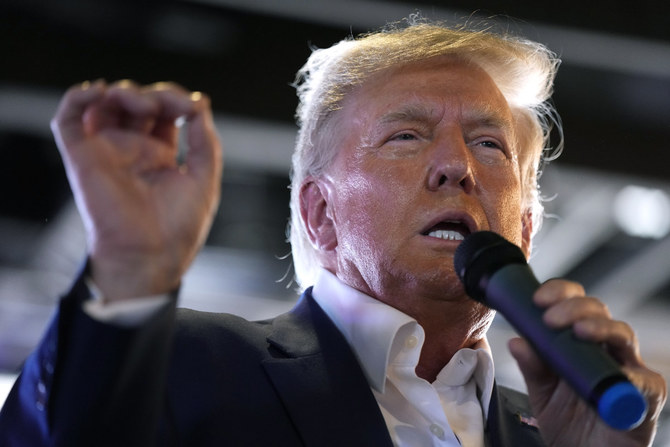WASHINGTON: All eyes are on Donald Trump as the Republican White House hopefuls prepare to do battle in the first debate of the 2024 race on Wednesday — with the main attraction threatening not to show up.
Five months ahead of the start of primary elections to choose the party’s flagbearer, the runaway frontrunner’s grassroots support is as strong as ever, but numerous criminal cases have cast a pall over his comeback bid.
The 77-year-old former president, who is rarely out of the headlines, has been vocal about possibly skipping the event in the midwesten city of Milwaukee, wary of sharing the limelight with lower-polling rivals.
“I am leading the runner up, whoever that may now be, by more than 50 Points. Reagan didn’t do it, and neither did others. People know my Record, one of the BEST EVER, so why would I Debate?” Trump posted on social media on Thursday.
The New York Times reported Friday that Trump had told aides he was planning to upstage his rivals by skipping the event, organized by Fox News, and instead sitting for an online interview with one of its former hosts, Tucker Carlson.
“We haven’t confirmed anything on our end,” a campaign spokesman told AFP.
Whether he shows up or not, Trump will be ripe for broadsides from opponents over the four criminal and three civil trials he faces involving allegations before, during and after his scandal-plagued presidency.
“Obviously, his legal issues are affecting this race,” Fox News host Bret Baier, who will be moderating, told the Milwaukee Journal Sentinel.
“All these candidates have been asked non-stop about what’s happening in courtrooms around the country. So he’ll be a part of this debate whether he’s there or not.”
Seven other candidates have qualified, including state governors Ron DeSantis and Doug Burgum, former vice president Mike Pence, Trump’s UN ambassador Nikki Haley and South Carolina Senator Tim Scott.
Businessman Vivek Ramaswamy and former New Jersey governor Chris Christie are threatening DeSantis’s runner-up spot in early nominating states Iowa and New Hampshire, and will be looking for openings to attack him.
The Republican National Committee has told Trump he needs to make a final decision by Monday if he wants a place onstage.
While the billionaire dominates the field, polling well above his opponents, some allies worry that a no-show could give his rivals a chance to create a viral moment and gain momentum.
Shortly after learning of his third indictment, Trump had dinner at his New Jersey golf club with Fox News executives who reportedly suggested that DeSantis would steal the show in his absence.
Other Washington watchers point out that Trump lost Iowa to Texas senator Ted Cruz in 2016 after skipping a debate.
Keen to take the wind out of his rivals’ sails, Trump called a news conference for Monday to release a 100-page report he said would bolster his false assertions of voter fraud in 2020 — but then canceled on the advice of his lawyers.
He is said to be mulling “counterprogramming” in addition to the Carlson interview, and may choose Wednesday or Thursday to surrender to the county jail in Atlanta.
He was indicted in the Georgia state capitol last week over an alleged conspiracy to steal the 2020 election and ordered to turn himself in by noon on Friday.
Meanwhile the pro-DeSantis super PAC Never Back Down offered a window into the debate strategy that may be adopted by the governor, who is looking for a jolt to reverse slipping poll numbers.
In a two-page memo posted online, it encouraged him to blast President Joe Biden, defend Trump from attacks by Christie and call surging political newcomer Ramaswamy “fake.”
“If you look at how this field develops, clearly, I’m the only guy that Trump’s campaign attacks, basically,” DeSantis told Fox News Radio on Wednesday.
“And then the other candidates, a lot of them don’t really say much about Donald Trump, and they focus more on me. So we’re going to be ready for all of that.”
Candidates been informed they have to pledge to “honor the will of the primary voters” and support the eventual nominee as a condition of taking part — although it is unclear how such a commitment could be enforced.
Trump has said he won’t sign, while Christie said he’d sign but would treat it “as seriously as Donald Trump took it in 2016.”
Trump has been more definitive in his intention to skip the second debate in California on September 27, after making clear he dislikes its host, the Ronald Reagan Presidential Foundation and Institute.














